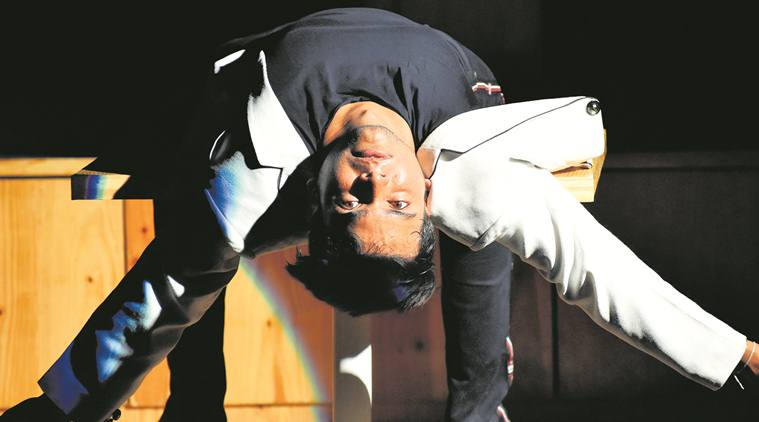Gigolo peeks into a problem that is brushed under the carpet and gets lost in the darkness.
Sex and murder make for a potent mix, but Gigolo-Story of a Male Escort promises to enter a forbidden area that theatre — or any art form — has rarely acknowledged. Lucknow-based actor Devang Tewari is travelling across the country with the solo in which a male escort records his life story as he waits for the police to burst in and arrest him for serial murders. Tewari has performed the play in Lucknow, Mumbai and Pune.
The soliloquy allows Gigolo to trace the protagonist’s journey from a small family in Andhra Pradesh to the dreamworld of Bollywood. The actor carries the play at even keel through its hour-long duration, even as the scenario changes from his childhood to his first job in a restaurant to being a background dancer for eminent actors.
Physically, Tewari grows into his protagonist as the story progresses towards the life of a gigolo. The moment the escort kills for the first time is defined powerfully and sensitively as a turning point of his life. Tewari’s psychopath is drawn from stereotype, all restless energy and wild hair falling to the eyebrows, as he kills several people to cleanse society. Tewari’s diction fits the bill — forceful and frenetic, as he hurtles to win over his listeners by narrating his side of the story.
But, how many issues can a plot hold without sagging? Gigolo packs in a range of sociopolitical concerns, from domestic violence to abuse of workers at eateries to the short shelf life of Bollywood dancers. The major thread is of paedophilia by a member of the family. These issues make the play socially relevant, but also keep it from delving into the dirt that a gigolo navigates every day.
The flesh trade is fraught with exploitation — as countless works on women sex workers have shown — but Gigolo’s script largely treats a male escort as yet another professional who provides services for a fee. Even if the protagonist becomes a gigolo out of choice, how does he negotiate the dangers of a grey and secretive zone of society? Then, again, the call of the gigolo is murder but the play represents these only with images on a chart.
At 22, Tewari seems driven towards egalitarian and inclusive theatre. He calls his production house Nobody’s Studios to emphasise its open ownership. He made Gigolo because he didn’t want to tread the old ground of Shakespeare and Indian classics. Immediately after the show and without stepping off the stage, Tewari breaks free of his character by asking the audience for feedback. He tells them that Gigolo is his first major performance though he has been on stage in ensemble productions and comedies. He shares that he has been receiving calls from young men who want to be escorts. He also reveals that he wants to take the play to Edinburgh Fringe this year to represent India on August 15. There is time yet to give Gigolo’s dark core an edgy contour.
Source: Read Full Article


